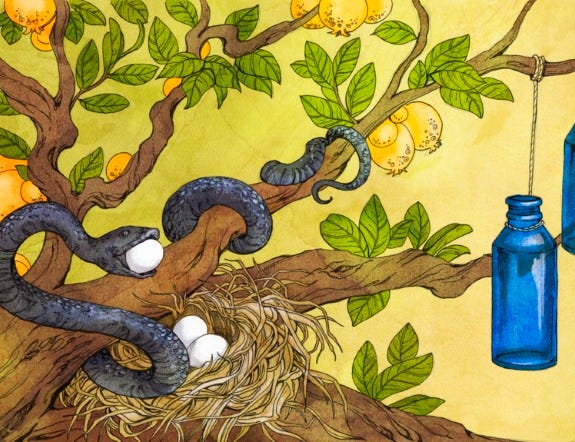This is our fourth reading roundtable and, while lots of you have read, liked, and commented on our prior prompts, we’ve noticed that you haven’t gone so far as to really engage with each other, or us, in responding to the stories themselves.
We figure maybe it’s because we went OTT (Over The Top) with information introducing the stories, not leaving enough space for your own voices and thoughts. So, this time, we’re taking a slightly different approach. Less introductory framing, more … space. For you. For discussion and exploration.
So, here’s what we’re going to try this time: today, I’m releasing this post with the story title and author, and a link to where you can read the story online (if you don’t have a hard copy tucked away on your shelves).
Our reading for this roundtable is a retelling (revision) of the classic tale Carina wrote about for this issue (ATU312 Bluebeard, or The maiden killer): the retelling is by Nalo Hopkinson and is called ‘The glass bottle trick’. It was first published in 2000, in an anthology of speculative fiction edited by Hopkinson (Whispers from the cotton tree root: Caribbean fabulist fiction).
You can read the story online at Fantasy magazine here.
This week, our focus is on reading the story and thinking about it.
I encourage you to read it all the way through at least once just for pleasure. For the leisurely, readerly experience. Once you’ve done that, you might like to read it again, this time with a more active or critical curiosity: asking yourself questions about why the story provoked whatever thoughts, feelings, or questions it raised for you. You might like to make some descriptive notes (What is going on in this story? Who are these characters and what are their relationships to themselves, each other, or their world? How is it written? In what ways does it ‘retell’ the traditional tale of Bluebeard?)
Later in the month, (on 17 January 2025) I’ll publish a follow-up post, further opening up our discussion of this story. I’ll offer some of my own thoughts and questions, and invite you to offer yours as well. I do hope you’ll join me in a robust and generative conversation about this amazing piece of work.
A little note on Orange & Bee reading roundtables
Orange & Bee’s reading roundtables are only available to paid subscribers. If you haven’t moved to that level yet, we hope you will consider joining us.
There are no set rules or guidelines to follow. Whatever your responses (thoughts! feelings! wonderings!), we invite you to offer them courageously and boldly. The only thing we ask is that you take an approach to the text that’s largely curious and appreciative, focused on engaging deeply and honestly with the text, and with each other.
We hope, through sharing readings with you, and reading them alongside you, to spark creativity and connection through collaborative close reading. Other things we hope to see emerge include insights into the craft of writing, the connection between folkloric traditions and contemporary writing, and a deeper understanding of the focus story through active engagement.





I haven't contributed to the roundtable before, and I hope this is in the right vein.
First read through thoughts are: I really enjoyed the modernity of the story and the change of cultural location, which worked beautifully with the familiar storyline. As the tale progressed I felt that the time period was somehow shifting to a more ancient, darker time. It was almost like parallel worlds, which to me, alludes to the two versions of Beatrice's experience. The life she planned and the one she ended up with once Samuel wooed/derailed her! The horror of her trapped existence and the potential that the dead wives will free her by consuming her, or Samuel - either of which scenarios would release her.
I enjoyed reading the interpretation of this classic tale from a fresh cultural perspective, especially the clear combination of Beauty and the Beast with Bluebeard. The snake, such a world wide creature of evil, or awakening, surely gives Beatrice the opportunity to change her fate where her street smartness and the motherly advice would not suffice, a creature which may or may not be a reference to Christianity. It speaks loudly, as does "Bluebeard," of women's abilities to see what is in front of her...or not.
I would like to hear any voice suggesting the roll of eggs in the story, whether those with a hard shell consumed by the snake, or the one, soft and unprotected which Beatrice holds in her hand as she discovers the horrors wrought by "Black Beauty."